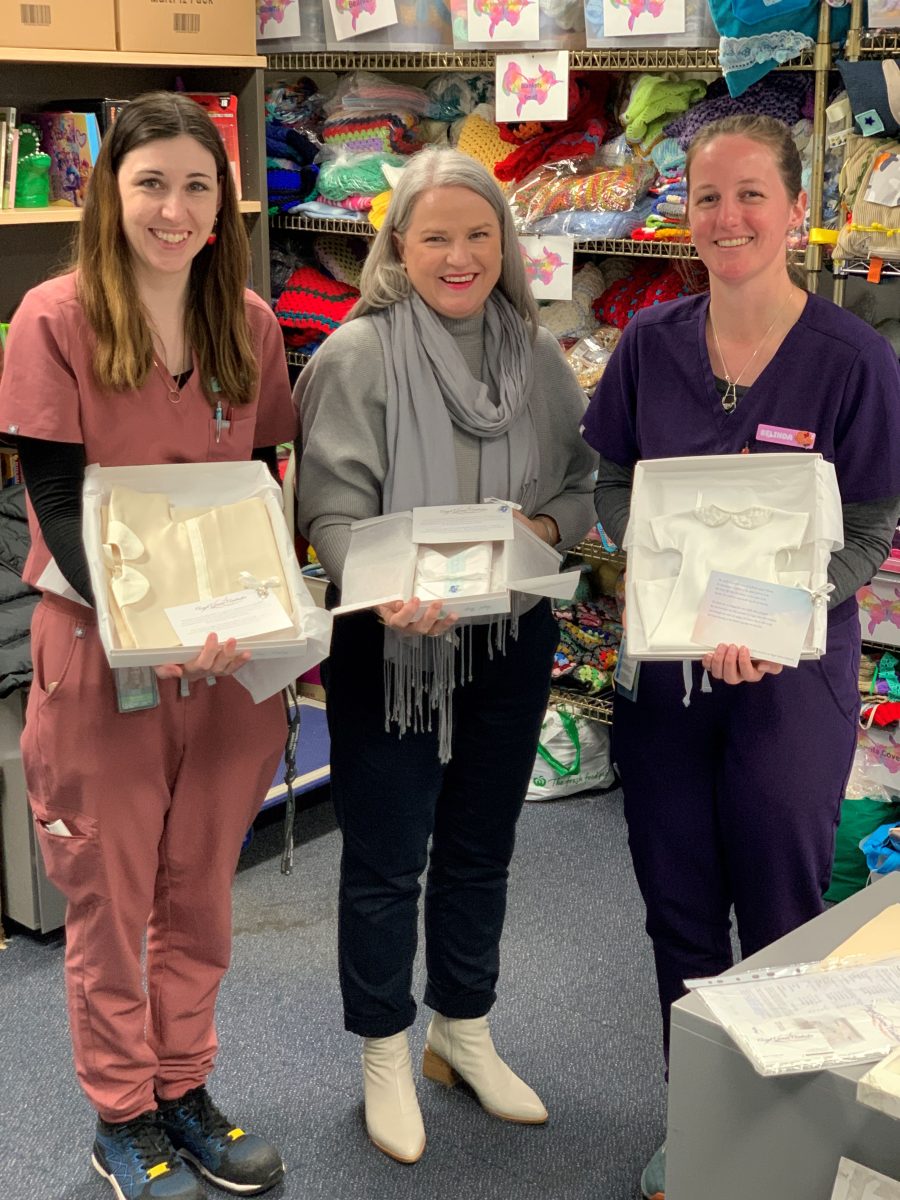
ACT Co-ordinator for Angel Gowns Australia, Karina Leslie (centre), delivers some of the bespoke pieces to Canberra Hospital staff. Photo: Supplied.
They’re called angel gowns. Tiny little bespoke garments, shawls and sleeping bags made from donated wedding dresses for babies who are stillborn or who do not survive after birth.
Painstakingly deconstructed by volunteer seamstresses, the wedding dresses are relieved of their tulle, shiny and glittery bits and remade into unique garments for babies to wear on their final journey – giving families a moment of peace and beauty before they dress their baby for the last time.
ACT co-ordinator for Angel Gowns Australia, Karina Leslie, who has volunteered with the group for more than 10 years, said she heard about them after she and her husband realised they weren’t able to have children. They had eloped and later, when talking with a friend about what to do with her wedding dress, heard about Angel Gowns.
Admitting she was not a seamstress, Karina could see the valuable work Angel Gowns was doing and soon found herself part of it.
The gowns are remade and given to families across Australia, through midwives, hospitals and funeral homes connected to the not-for-profit charity.
The Angel Gown volunteers make sure everything that can be used from the wedding gowns is used. Not only do they make the tiny dresses and shawls for the babies, they also put the items like tulle and beading to good use. The tulle is used to make tutus which are donated to hospitals and homes as gifts for children, the beading is made into jewellery, materials like satin can be used to make shoes – everything has a purpose.
“You don’t have to be able to sew to be part of this,” Karina said.
“There are lots of other ways you can help. There’s administration, event planning, making cards, sharing stories, help on stalls – if people are interested in what we do, I’ll find a job for them,” she said.
Once donated, the gowns are stored carefully – donors are asked not to have them dry-cleaned beforehand as the chemicals can affect what can be done with them. Volunteers will hand wash them if necessary. Then the seamstresses go over the gowns thoroughly to determine their best use before they are deconstructed, with items like tulle, lace and beads removed so only the fabric is left.
“There are strict protocols with what we do,” Karina said.
“Everything is registered when it comes in, all the forms are filled out, and we rebag the dress and store it in a special facility.” They then go through various quality checks after the baby’s gown is made.
Angel Gowns can even help with providing urgent gowns to funeral homes or hospitals if required.

Angel Gowns Australia’s recent stall at Canberra’s Craft Alive event showing some of the pieces they make. Photo: Supplied.
Next month, on 12 October, Angel Gowns marks its 10th year in Canberra and is keen to invite more people to help it do what it does best – try to ease the burden on a family during the most tragic of times.
“In the old days, they would just remove the babies from mothers,” Karina said.
“It was a terrible thing to do. What we are trying to do is not upset mothers any more than they already are. We want to give them a chance to acknowledge that their child existed by making these gowns for them.
“Some people don’t want them, which is fine, but they should have the choice.
“You can’t change what’s happened, but hopefully, you can make it a little easier for some.”
Since it began in Australia a decade ago, Angel Gowns has supplied about 18,000 gowns to more than 280 hospitals and 180 funeral homes nationwide.
To mark the anniversary, Canberra brides are invited to donate their wedding dresses to Angel Gowns at a special donation centre at the Southern Cross Club, Woden, on 12 October between 1 pm and 5 pm.
For more information, email Angel Gowns at canberra@angelgownsaustralia.org.au.












